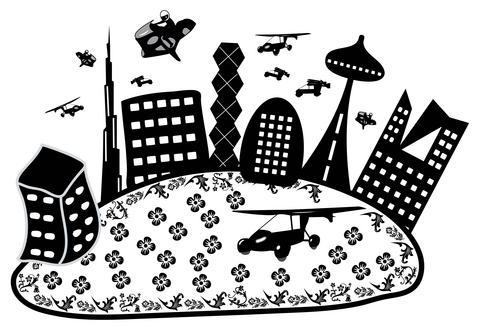Civil aeronautics is in the midst of becoming a "mature" industry, with all the drawbacks that this entails. For decades, technological advances have been essentially incremental and the industry remains largely based on long-haul transport aircraft, with an emerging small jet component and a legacy of general aviation markets and products. But it has become increasingly clear that the industry cannot survive in this form.
The problems bedeviling the industry include pollution from emissions, increasing competition (particularly from communications technology, which has made business travel less necessary), air traffic control delays and inefficiencies, expanding noise restrictions, safety and security concerns and an overall business environment highly dependent on fuel prices. Solutions for all of these problems will probably require a complete reinvention of airplane technology.
The greatest hope is to be found in the ongoing information, bio-, nano-, energetics, and quantum technology revolutions. The IT revolution and associated "swarm" technologies enable the foremost solution: A "digital airspace" that is wholly automatic in terms of air traffic control, navigation and vehicle operations. Automatic aircraft operation is already becoming commonplace, but further increases will require a similarly automatic airspace.

ILLUSTRATION: LANCE
A digital airspace would in turn enable a complete revolution in personal mobility. Together with new technologies enabling Super-Short Takeoff and Landing (superSTOL) a digital airspace would put safe, quiet, affordable, street-in-front-of-your-house personal air vehicles within sight. So-called flying high mobility multipurpose wheeled vehicles (HumVees) would create a superb transportation system for areas lacking intercity roads and eventually would supplement -- or perhaps supplant -- cars.
The variety of machines currently under study is accessible at www.roadabletimes.com.
The estimated worldwide market for such vehicles is in the range of US$1 trillion and their use would erode the scheduled domestic airline customer base by enabling 300km "commutes" and providing huge cost avoidance for roads and bridges.
Nevertheless, even given eventual development of an affordable, safe, fly/drive, airport-independent personal transportation system, there would still be a need to reinvent long-haul transport, especially for transoceanic flights. The current machines of this genre are direct descendants of the Boeing 707 and, after many decades of evolutionary improvement, this design approach simply lacks the scope to address the many problems that must be solved.
There are several alternatives, such as the blended wing body and strut/truss braced wings, which offer major potential increases in lift-to-drag ratio and improvements in structural weight fraction. Such improvements in these parameters would provide design margins to address most of the current problems, with the exception of emissions.
The issue of water emissions can be addressed by designs that enable long-haul aircraft to cruise below 9,000m. Such designs could be enabled by using circulation control for high lift and employed at cruising altitude for ride quality. The resulting STOL (short takeoff and landing) performance could also improve airport productivity.
On the other hand, emissions of carbon dioxide can be reduced simply by using biofuels, made from plants whose carbon dioxide "price" was paid via uptake of the very same gas from the atmosphere during their growth. Reductions of other greenhouse gases, such as nitric oxide, are attainable through clever combustor design.
Given the number and severity of problems currently plaguing civil aeronautics, the conventional approach of evolutionary changes to current paradigms is no longer sufficient. Instead, the industry must re-invent itself. With the advent of a digital airspace, and with appropriate research support, success would be both possible and likely.
Dennis Bushnell is chief scientist at the NASA Langley Research Center in Virginia. Copyright: Project Syndicate
In their recent op-ed “Trump Should Rein In Taiwan” in Foreign Policy magazine, Christopher Chivvis and Stephen Wertheim argued that the US should pressure President William Lai (賴清德) to “tone it down” to de-escalate tensions in the Taiwan Strait — as if Taiwan’s words are more of a threat to peace than Beijing’s actions. It is an old argument dressed up in new concern: that Washington must rein in Taipei to avoid war. However, this narrative gets it backward. Taiwan is not the problem; China is. Calls for a so-called “grand bargain” with Beijing — where the US pressures Taiwan into concessions
The term “assassin’s mace” originates from Chinese folklore, describing a concealed weapon used by a weaker hero to defeat a stronger adversary with an unexpected strike. In more general military parlance, the concept refers to an asymmetric capability that targets a critical vulnerability of an adversary. China has found its modern equivalent of the assassin’s mace with its high-altitude electromagnetic pulse (HEMP) weapons, which are nuclear warheads detonated at a high altitude, emitting intense electromagnetic radiation capable of disabling and destroying electronics. An assassin’s mace weapon possesses two essential characteristics: strategic surprise and the ability to neutralize a core dependency.
Chinese President and Chinese Communist Party (CCP) Chairman Xi Jinping (習近平) said in a politburo speech late last month that his party must protect the “bottom line” to prevent systemic threats. The tone of his address was grave, revealing deep anxieties about China’s current state of affairs. Essentially, what he worries most about is systemic threats to China’s normal development as a country. The US-China trade war has turned white hot: China’s export orders have plummeted, Chinese firms and enterprises are shutting up shop, and local debt risks are mounting daily, causing China’s economy to flag externally and hemorrhage internally. China’s
During the “426 rally” organized by the Chinese Nationalist Party (KMT) and the Taiwan People’s Party under the slogan “fight green communism, resist dictatorship,” leaders from the two opposition parties framed it as a battle against an allegedly authoritarian administration led by President William Lai (賴清德). While criticism of the government can be a healthy expression of a vibrant, pluralistic society, and protests are quite common in Taiwan, the discourse of the 426 rally nonetheless betrayed troubling signs of collective amnesia. Specifically, the KMT, which imposed 38 years of martial law in Taiwan from 1949 to 1987, has never fully faced its